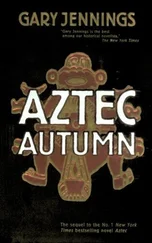Gary Jennings - Aztec
Здесь есть возможность читать онлайн «Gary Jennings - Aztec» весь текст электронной книги совершенно бесплатно (целиком полную версию без сокращений). В некоторых случаях можно слушать аудио, скачать через торрент в формате fb2 и присутствует краткое содержание. Жанр: Старинная литература, на английском языке. Описание произведения, (предисловие) а так же отзывы посетителей доступны на портале библиотеки ЛибКат.
- Название:Aztec
- Автор:
- Жанр:
- Год:неизвестен
- ISBN:нет данных
- Рейтинг книги:4 / 5. Голосов: 1
-
Избранное:Добавить в избранное
- Отзывы:
-
Ваша оценка:
- 80
- 1
- 2
- 3
- 4
- 5
Aztec: краткое содержание, описание и аннотация
Предлагаем к чтению аннотацию, описание, краткое содержание или предисловие (зависит от того, что написал сам автор книги «Aztec»). Если вы не нашли необходимую информацию о книге — напишите в комментариях, мы постараемся отыскать её.
"Anyone who reads, anyone who still lusts for adventure or that book you can't put down, will glory in Aztec."--Los Angeles Times
Aztec
Aztec
Aztec — читать онлайн бесплатно полную книгу (весь текст) целиком
Ниже представлен текст книги, разбитый по страницам. Система сохранения места последней прочитанной страницы, позволяет с удобством читать онлайн бесплатно книгу «Aztec», без необходимости каждый раз заново искать на чём Вы остановились. Поставьте закладку, и сможете в любой момент перейти на страницу, на которой закончили чтение.
Интервал:
Закладка:
This was all very sudden, but I accepted, expressing my gratitude for his thoughtfulness.
"Just one thing," he said. "Can you be ready to leave tomorrow morning? You understand, Head Nodder, my oarsmen will want to be safely back on their home shore before the lifeless days begin."
* * *
Ah, the Señor Bishop! Once more I am pleased and honored to have Your Excellency join our little gathering. And once more, my lord, your unworthy servant makes bold to give you worshipful greeting and welcome.
...Yes, I understand, Your Excellency. You say that I have not hitherto spoken sufficiently of my people's religious rites; that you especially want to hear in person about our superstitious dread of the hollow days; that you wish to hear at first hand my account of the ensuing month's heathen rituals of petition to the rain god. I understand, my lord, and I shall cause your reverend ears to hear all. Should my old brain wander in its recollection, or should my old tongue skip too lightly over any details of relevance, please do not hesitate, Your Excellency, to interrupt with questions or demands for elucidation.
Know, then, that it was on the sixth-to-last day of the year Six House that Prince Willow's carved and bannered and canopied acáli put me ashore on a Xaltócan jetty again. My splendid borrowed craft of six oarsmen rather put to shame the uncovered, two-oared canoe of the Lord Red Heron which was, that same day, likewise bringing his son home from school for the ceremonial month of Cuahuitl Ehua. I was even noticeably better dressed than that provincial princeling, and Pactli involuntarily gave me an ingratiating nod before he recognized me and his face froze.
At my house, I was welcomed like a hero home from some war. My father clapped his hands on my shoulders, which now nearly matched his in height and breadth. Tzitzitlini wrapped both arms around me in a squeeze that would have looked merely sisterly to anyone who did not see her fingernails digging softly But suggestively into my back. Even my mother was admiring, if mainly of my costume. I had deliberately chosen to wear my most wonderfully embroidered mantle, with the bloodstone clasp at the shoulder, and my gilt sandals which laced almost to the knee.
Friends and relations and neighbors came crowding in to gawk at the rover returned. Among them, I was happy to see, were Chimali and Tlatli, who had each begged a ride home from Tenochtítlan on limestone freight acaltin returning to the island to ride out the lifeless days at their moorings. My family's three rooms and dooryard, which now appeared to me to have curiously shrunken, were quite overflowing with visitors. I do not attribute that to my personal popularity, but to the fact that midnight would bring the beginning of the hollow days, during which there could be no social mingling.
Not many of the gathered people, except my father and some other quarriers, had ever been off our island, and were naturally eager to hear of the outside world. But they asked few questions; they seemed content to listen to me and Chimali and Tlatli trading tales of our experiences in our separate schools.
"Schools!" snorted Tlatli. "It is precious little time we have for school work. Every day the vile priests roust us out at dawn to sweep and clean our quarters and all the rooms of the whole building. Then we must go to the lake to tend the school's chinampa, and pick maize and beans for the school kitchen. Or go all the way to the mainland to chop wood for the sacred fires, to cut and fetch bags full of maguey thorns."
I said, "The food and firewood I can understand, but why the thorns?"
"For penance and punishment, friend Mole," Chimali growled. "Break the slightest rule and a priest makes you prick yourself repeatedly. In the earlobes, in the thumbs and arms, even in private places. I am punctured all over."
"But even the best-behaved suffer too," added Tlatli. "Every other day seems to be the feast day of some god or other, including many I have never heard of, and every boy must shed blood for the offering."
One of the listeners asked, "When do you find time for studying?"
Chimali made a face. "What little time there is does not avail us much. The teacher priests are not learned men. They know nothing except what there is in the textbooks, and those books are old and smudged and falling apart into shreds of bark."
Tlatli said, "Chimali and I are fortunate, though. We did not go for book learning, so the lack of it does not much trouble us. Also, we spend most of our days in the studios of our art masters, who do not waste time on religious drivel. They work us hard, so we do learn what we came to learn."
"Some other boys do, too," said Chimali. "Those who are similarly apprenticed out—to physicians, feather workers, musicians, and the like. But I pity those who came to learn classroom subjects like the art of word knowing. When they are not engaged in rituals and bloody mortification and menial labor, they are being taught by priests as ignorant as any of the students. You can be glad, Mole, that you did not get into a calmécac. There is little to learn in one, unless you desire to be a priest yourself."
"And nobody," said Tlatli, shuddering, "would want to be a priest of any god, unless he wants never to have sex or a drink of octli or even a bath just once in his life. And unless he truly enjoys hurting himself as well as seeing other people in pain."
I had once felt envy of Tlatli and Chimali, when they donned their best mantles and went away to their separate schools. Now here they were, still wearing the same mantles, and it was they who envied me. I did not have to say a word about the luxurious life I enjoyed at the court of Nezahualpili. They were sufficiently impressed when I remarked that our textbooks were painted on smoked fawnskin for durability, and when I mentioned the absence of religious interruptions, the few rules and little rigidity, the willingness of the teachers to give private tutorial sessions.
"Imagine!" murmured Tlatli. "Teachers who have worked at what they teach."
"Fawnskin textbooks," murmured Chimali.
There was a stir among the people nearest the door, and all of a sudden Pactli strode in, as if he had deliberately timed his arrival to display the superior product of the most select and prestigious kind of calmécac. Numerous persons dropped to kiss the earth to the son of their governor, but there was not room for all to do so.
"Mixpantzinco," my father greeted him, uncertainly.
Ignoring my father, not bothering to utter the customary response, Pactli spoke directly to me. "I came to request your aid, young Mole." He handed me a strip of folded bark paper and said, as comradely as he knew how, "I understand that your study is concentrated on the art of word knowing, and I ask that you give me your opinion of this effort of mine, before I return to school and submit it to the criticism of my Lord Teacher." But while he spoke to me, his eyes shifted to my sister. It must have cost the Lord Joy a pang, I thought, to have to use me as an excuse for visiting before midnight should make a visit impossible.
Though Pactli could not have cared a little finger for my opinion of his writing—he was openly leering at my sister now—I flipped through the pleated pages and said boredly, "In which direction am I supposed to read this?"
Several people looked aghast at my tone of voice, and Pactli grunted as if I had struck him. He glared at me and said, through his teeth, "From left to right, Mole, as you know very well."
"Usually from left to right, yes, but not always," I said. "The first and most basic rule of writing, which apparently you have not grapsed, is that the majority of your pictured characters must all face in the direction the writing is to be read."
Читать дальшеИнтервал:
Закладка:
Похожие книги на «Aztec»
Представляем Вашему вниманию похожие книги на «Aztec» списком для выбора. Мы отобрали схожую по названию и смыслу литературу в надежде предоставить читателям больше вариантов отыскать новые, интересные, ещё непрочитанные произведения.
Обсуждение, отзывы о книге «Aztec» и просто собственные мнения читателей. Оставьте ваши комментарии, напишите, что Вы думаете о произведении, его смысле или главных героях. Укажите что конкретно понравилось, а что нет, и почему Вы так считаете.











